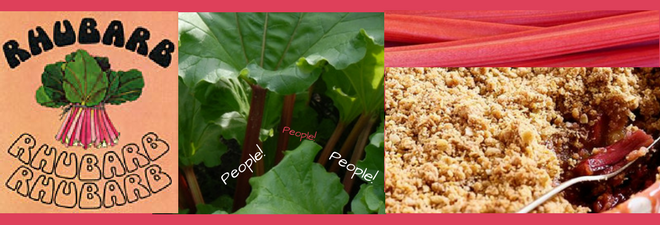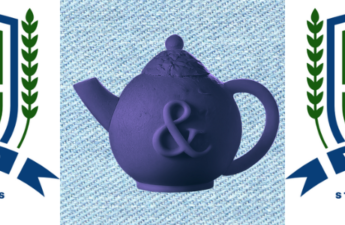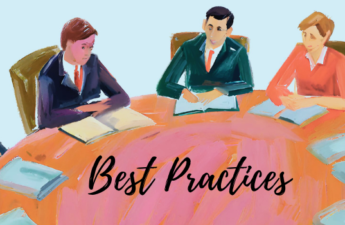
Rhubarb, Rhubarb Words
A definition of rhubarb – the noun – is meaningless background noise.
This meaning is attributed to the mid 19th century practice of the theater company of Charles Kean at the Princess Theater, London. In crowd scenes actors repeated the word “rhubarb” to mimic the sound of indistinct conversation.
Rhubarb was chosen because it has no harsh-sounding consonants or clear vowels. Imagine all the cast of thousand extras in a Biblical epic muttering rhubarb, rhubarb during the chariot race.
The verb “to rhubarb” means to shoot at unplanned-for objectives. It derives from the RAF WW2 code name for operations by fighters and bombers in low-level flight in search of opportunistic targets.

Rhubarb is also the name of a wonderfully undemanding garden vegetable with a distinctive sharp, tangy, astringent, sour, and refreshingly tart flavor.
Easy to grow in most zones, likes to be well-fed with compost and is prone to rapid bolting if not kept in check.
Well sweetened, it’s really good in pies, cobblers and crumbles, mixes well with berries, and is great with custard, cream or ice cream. And it’s annoying to wake up wanting some and know that it is too early in the season.
Alas and Alack! Rhubarb is no more
Yes – it is true. Rhubarb is among the words switched out in the new edition of the Oxford Junior Dictionary. Here it is among the other horticultural, edibles, eatables removed to make room for the vocabulary changing environment of children.
Acorn, allotment, almond, apricot, ash, bacon, beech, beetroot, blackberry, blacksmith, bloom, bluebell, bramble, bran, bray, bridle, brook, buttercup, canary, canter, carnation, catkin, cauliflower, chestnut, clover, conker, county, cowslip, crocus, dandelion, diesel, fern, fungus, gooseberry, gorse, hazel, hazelnut, heather, holly, horse chestnut, ivy, lavender, leek, liquorice, manger, marzipan, melon, minnow, mint, nectar, nectarine, oats, pansy, parsnip, pasture, poppy, porridge, poultry, primrose, prune, radish, rhubarb, sheaf, spinach, sycamore, tulip, turnip, vine, violet, walnut, willow.
The OJD is aimed at children age 7-9. There are probably very few such children who read the love poetry of C16th Sir Philip Sydney but the OJD would not be helpful in understanding his rhubarb words.
Rhubarb Words
Astrophil and Stella is a sequence of sonnets and songs written by Sir Philip Sidney (1554–1586). It tells the story of Astrophil (or Astrophel), whose name means star-lover, and his hopeless passion for Stella, whose name means star. The poems seem to have been inspired by his attraction to Lady Penelope (1563–1607), of the Devereux family.
Here’s number 14 in the series in which the lovelorn poet argues with a disapproving friend. The poet’s inner torment – “gripe’ – is made worse by the friends painful “rhubarb words”.
Astrophil and Stella 14: Alas, have I not pain enough, my friend
There’s a lot more rhubarb in this powerful poem by John Hodgen including what it means in baseball. But this poem is not about baseball but rather what it means to send young people to war and those so often hollow rhubarb words like “thoughts and prayers” and “thank-you for your service”.
Capital One
All day I have been thinking about the color of his cauterized skin,
the burned young man lying flat on his back on the rehab slab in Wiesbaden,
and think, finally, that it is the color of rhubarb, that drab maroon and green,
but seared on, blasted into a mottled, speckled, crystallized sheen.
Rhubarb, meaning a fight or disagreement, the ump getting into it with a player,
their faces turning red, sputtering, blustering, kicking dirt on each other,
until finally someone gets vulgar, says something about the other one’s mother.
Rhubarb, from the ancient word for the Volga River, its watery line of demarcation,
and the barbarians who lived beyond it, the real ones, Vandals, Visigoths, Huns,
not the ones we see now as buffoons in commercials, battle-axing, caterwauling
the civilized world for the right credit card, for Capital One, asking us what’s in
our wallets. CNN says the rehab here is good, so the film crew has come in.
They thank him for his service. They tell him he’s a credit to his country, to all of us,
all our brave young women and men. They ask if he has any hobbies, if he can tell us
what he’d most want to do that he used to enjoy doing. He says he’d like to walk again.
I hate everyone, all of us who have sent him into flames. I hate the film crew, hate CNN, the rehab facility, every tube that goes in and out of him, every monitor that beeps, even the morphine feed that drips and seeps. They ask him if it is frustrating and he weeps.
-John Hogden


